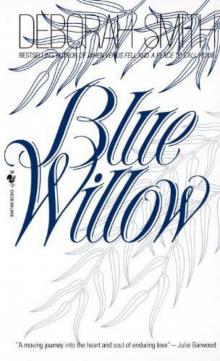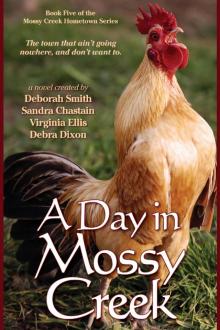- Home
- Deborah Smith
Alice At Heart Page 14
Alice At Heart Read online
Page 14
“Oh, no. He came here with the navy.”
I looked at her a long time. “Ours?”
She sighed. “Theirs.”
The hair rose on the back of my neck. “Pearl, are you saying—”
“There were German submarines everywhere along the eastern coasts, you know. We Bonavendiers were actively involved in spying on them. Father and Mother and Lilith—who was so young then but, oh, what a patriot she was!—they searched out at least a dozen, which Father reported to the authorities. Very discreetly, of course. We have our family traditions, Alice. We don’t show off. We don’t brag. We are merfolk and specially endowed. No need to gild the water lily.”
“There were German submarines,” I prodded. “Yes. Go on.”
“I was playing in a little bayside cove near the lighthouse one day, and one of them surfaced. I ducked down and watched as the crew climbed out the top and sunned on the deck. I watched this tall, beautiful young man edge away from the others. I sang to him, and he looked right toward me. He leapt into the water, Alice! Dived right in and began to swim for shore. I thought he was playing, but the yells of the others and the way he swam—he wasn’t playing, I realized; he was trying to get away.”
I inhaled sharply. “Barret was that crewman on a Nazi submarine?”
“Oh, Alice, yes, but he was just a boy who’d been scooped up for the service, along with thousands of others. A homesick boy who loved the sea. He hated the Nazis. He hated the war.” She paused and looked at me with trust as light as a butterfly’s wing. “His great-grandfather was one of our kind, you see. Barret heard me singing in the surf. He knew what that meant. He knew where he belonged.”
I spent some time bending and unbending a dried stalk of the sea oats that grew up between the gazebo’s floorboards. Gathering my thoughts. Indulging, expanding, resisting. “Barret’s great-grandfather was a merman?”
“Mmmm. A Nordic charmer, Barret says.”
“Then Barret is also a—”
“A merman?” she finished solemnly. “I suppose. He doesn’t have any obvious traits, but then there are many degrees of merfolk. Lilith believes practically everyone has a drop or two of us in them. But very watered down, of course.”
“Of course.”
Her face grew solemn. “He swam faster than anyone could imagine, but the crew of his submarine still managed to shoot him.”
“His own crewmates shot him?”
She nodded. “They shot him in the back as he swam. He was hit twice. That’s why he limps. Why he can’t swim now. He was crippled.”
“Oh, Pearl.”
Tears filled her eyes. “He sank, drowning and bleeding. I dived down and caught him by the arm. I was just a tiny girl, but I managed to tug him to the banks. It’s very wooded there, and there was some brush hanging over the sides. I got his head propped above water and hid him beneath the brush until the others left. Then I swam as fast as I could to the cove, screaming for help. Father and Mother came and got him, and then we kept him.”
“The family hid him and nursed him back to health?”
“Yes. And we’ve been together ever since.” Her smile trembled a little. “He would have been deported or imprisoned if the government had known about him in those early years. Now, well, no one remembers, and no one cares enough to ask. But during all those years he was in hiding—had become a man without a country—I made my decision to never leave him. We are soulmates, Alice. We made our peace with the forces that brought us together, and we wanted so badly to have children.” She looked out at the ocean and added very quietly, “When we couldn’t, he tried to make me give him up because of that. He said it was his fault somehow. But I refused to listen. The ocean gave us to each other. We have been blessed enough.”
I sat in silence, reached over and touched her shoulder, and she took my hand and kissed it before she let it go. I was finally beginning to piece my sisters’ youthful lives into the patterns they fit now, and my heart ached for them. “Tell me about Mara, please,” I said finally.
Pearl told me about Mara and C.A. Randolph’s turbulent love affair, how cruelly she treated him. She broke his heart, then went to New York to work—and married a new lover within weeks. “She married one of our own kind, very handsome, very rich, and devoted to her,” Pearl explained. “But she could never quite love him the way she loved C.A. Of course, she was horrified to discover that fact—that even a merman couldn’t win her heart away from C.A.”
“Why did she reject him so foolishly to begin with?”
“Prejudice. Arrogance and prejudice. Poor C.A. was only a college boy then. She took revenge on him, but ultimately her revenge hurt many lives.”
Mara’s husband had taken to flying a small plane over the waters of their coastal New York home. “Merfolk don’t fly well,” Pearl said somberly. “We grow air sick at all but very low altitudes, and we envy the ordinary folk for their ability to take to the sky like birds. Perhaps Mara’s husband felt he could best her memory of C.A. Randolph if he mastered something so difficult.” She hesitated, then looked at me with misery. “But, Alice, he couldn’t win. He crashed the plane one day with their two children aboard.”
I looked at Pearl quietly. I feared the worst. “Does Lilith have an equally tragic story?”
She nodded and her eyes filled with tears. “His name was Riyad. He’s a Muslim, and a prince. In his country, the families arrange the marriages. When he was a boy, he was promised in marriage to a princess.”
“He and his people were all . . . our kind?”
“Oh, yes. Of the highest order, like us. He had the loveliest webbing. The color of dark tea.”
I sat there thinking, royal, muslim, merman. “How did he and Lilith meet?”
“They were diplomats together in Paris. When she was young, she worked for the embassy there. They fell desperately in love—and I do mean desperately—because our kind does not love lightly. He couldn’t bring himself to tell her about his betrothal, and when she found out, she said she could never forgive him. He was heartbroken—and ashamed of using deceit. He returned to his country.” Pearl paused, crying a little. “He did not know that Lilith was with child.”
I sat back in my chair. Lilith. A mother. And this Riyad, the unsuspecting father. No wonder she had sympathy for my mother. I thought of the water fountain outside the breakfast nook. Lilith’s love for that special place was poignant suddenly. “How could he not have sensed such new life?”
“Surely—as you’ve come to understand—we merfolk can be quite stubborn when we want to shut each other out of our songs. Lilith closed herself away from him—oh, such pride, such pain! So he left her, not knowing. She came home, here, and bore the child.” Pearl looked at me tearfully. “A tiny little boy. He died within the hour. She went mad with grief. We were afraid she’d die as well. She began to disappear into the ocean for days at a time. Our kind always turns to the water for comfort, Alice.”
“Because we’re descended from Melasine, who took her own comfort there.”
“Oh, yes. There is such courage in the Old Ones, such nobility. Lilith believes they understand the deepest love, the truest hope, and are an inspiration we must follow. After all, Melasine was willing to love a man even while knowing she’d outlive him and their children, and even their grandchildren and great-grandchildren and so forth. Knowing that she could never share his world fully, or he, hers. And that ultimately she would spend much of her life only remembering him and what they’d created together. Such is the curse of all the Old Ones who fall in love. And all the Water People must remember to love wisely, too. We’re too powerful for our own good.”
“I see.”
Pearl sighed. “Riyad has lived with his wife honorably, from all we’ve heard. She died last year.”
“Then he and Lilith are free to see each other.”
“Lilith has too much pride to sing to him. And she’s made Mara and me promise not to contact him.” Pearl paused, squinting at me, then ga
sped. “But you’ve made her no promise! You could sing to him!”
I stared at her. “What? No. No, really. I wouldn’t even know how to—”
“You’ll learn! It’s instinctive! Please, when you do understand, please try!” She rose in joy, clapping her hands and laughing. “Oh, how wonderful! You’ll call for Riyad! I knew you’d bring us good luck! We’ve found you, and now the pieces of our hearts are falling into place! And Riyad will reunite with Lilith!” She threw her arms around me as I sat there gaping at her. “Oh, thank you, dear little sister!”
She danced away on the beach, leaving me too stunned to speak, much less sing.
“What kind of crap is this?” C.A. asked, sweat pouring from beneath his shaggy silver hair, his face furious. He paced the dock at Randolph Cottage, glaring at the hulking vessel Griffin had moored to it.
Griffin ignored him for a moment, letting the tension and the scene align themselves. The April air grew hotter every day, the ocean warmer. Great white clouds mounded in the blue sky over Sainte’s Point. Griffin had purchased a thirty-foot barge with a large cabin on the bow end and a heavy crane on the stern. Aboard it, Griffin had assembled diving gear, dredging equipment, and other tools of the salvage trade.
“What the hell are you doing?” C.A. said finally. “What is all this?”
“It’s a treasure-hunting rig,” Griffin replied.
“Goddammit, I know that.”
“Good.” Griffin limped around the barge’s deck, still unsteady but growing stronger. His scars were finer, now, and the work outdoors was reviving the color of his skin. But the rush of blood from his exertions turned the scars scarlet on his chest and back and gave the scar on his clean-shaven face the look of a purplish zipper. Sometimes he worked shirtless, and the men who delivered the gear he’d ordered tended to turn their eyes from him. He looked at himself wearily sometimes and realized he was still ugly.
C.A. lost all patience . “Goddammit, Griffin, I thought you were giving up your work as a treasure hunter!”
“I am. This gear is for one job only.” Griffin calmly straightened, the hot, spring wind ruffling an old chambray shirt he’d pulled on. In a pocket of his faded khaki trousers, he carried a ring of his father’s and a small pearl pendant of his mother’s. The dolphin sculpture sat atop a piling nearby. Talismans. “I’m going to bring up the Calm Meridian.”
C.A. paled, put a hand on a dock post, and leaned heavily. “That is the most morbid, useless, obsessive—”
“I know.”
“It’s lain out there for over thirty years. What’s left of it is in fragments.”
“Then I’ll bring up the pieces.”
“If there’d been any evidence of your parents’ bodies, it would have been found right after the accident. You know I searched.”
“Not the way I intend to search.”
“Just what do you hope to prove?”
“I want to know why my father took us out there in a storm. I want to know why my mother let him.”
“Those are impossible questions to answer.”
“Maybe not. The Bonavendier sisters know what happened. I’m sure they do.”
“No Bonavendier will help a Randolph prove they lured your parents into a storm.”
“We’ve always blamed the Bonavendiers. I want to know if they really provoked the accident. I expect they want to prove it, too. If they’re innocent.”
“Goddammit. Goddammit.” C.A. climbed down onto the barge’s deck with the grace of an aging sportsman. A big man used to being alone, he confronted Griffin with no decorum at all. A fist rose and shook beneath Griffin’s chin. C.A. spread his fingers, jabbed the air, bulged at the collar and the eye socket.
Griffin had never seen him lose control that way before.
“There’s nothing to prove! Stay away from the Bonavendiers,” C.A. yelled. He took a deep breath, shut his eyes, lowered his hand, then looked at Griffin again. “They get whatever they want, and by the time they’re finished with you, you won’t give a damn for yourself.”
“They’re not magicians. They’re not witches.” Griffin watched his expression carefully, managing a slight, probing smile. “Are they, C.A.?”
“I don’t know what they are, but I know you shouldn’t get within a mile of them. They’ve brought our family nothing but trouble.”
Griffin stepped toward him, gauging every nuance of reaction, looking for hidden clues. “How was my mother treated by our family? Was she unhappy? Did my father protect her?”
C.A. groaned. “He tried. He did try. It was hard, Griffin. Your mother had wild ideas. She was . . . different.”
“My father loved her. My memories . . . I feel it. They loved each other.”
“Hell, yes, he adored her. He lived for her. But she might as well have been a Bonavendier. She was impossible for your father to resist. That’s why I’m begging you to drop this plan. Stay away from the wreck of the Calm Meridian. Stay away from Sainte’s Point. Stay away from those women.”
Griffin put a hand on the older man’s shoulder and squeezed. “When I was a kid, I heard some things, C.A. Overheard the adults talking. About you . . . and Mara Bonavendier.”
C.A. stiffened. “They said you were involved with her. They said she rejected you. They said that’s what changed you. They said you were never the same after that.”
“Stay out of my past. Worry about yourself. You’ll end up alone and bitter, too. Because if this . . . Alice . . .this new one—” he jerked his head toward Sainte’s Point”—gets her claws into your soul, trust me, you’ll wish you’d died with your parents.”
He strode away.
17
The fantastic abilities of Water People are rooted in the physical laws of nature, not fairytales. I say that quite seriously.
—Lilith
“Griffin is coming here today to make an attempt at winning your loyalty and estranging you from us,” Lilith said to me at breakfast this morning. “Can’t you feel it?”
I stared at her. “Estrange me from you? Because he’s a Randolph and Randolphs never approve of Bonavendiers? Is that it?”
“I’ll let him tell you.”
I assumed it was a petty mystery, of some importance to them but not me. “I’ve kept to myself all my life. I don’t know much about men. I’m not ready to see him in person again.”
A Tanglewood appeared in the enclave’s doorway, wide-eyed and excited. “Griffin Randolph is at the docks, madam. He’s here to see the Alice.”
I froze. Lilith stood and touched my shoulder. “You’re ready. Go and listen to him, my dear. See what he wants. And make him listen to you in return.” Her eyes were a little sad. “You’ll come back with some questions for me and we’ll talk.”
I didn’t like the sound of that.
Every pair of eyes on this island is secretly looking at me, Griffin thought. He smiled—a defense reaction, a showing of colors—as he stood warily on the dock in the cove of Sainte’s Point. The Sea Princess—the same ketch that had belonged to his parents and that Griffin had sailed as a boy—was tethered to a piling behind him. Griffin had taken it out of storage and refurbished it. The marble sculpture of the boy and the dolphin was safe in a display case below deck.
He’d neatened his thick black hair, shaved and scrubbed and cologned himself. The scar on his face had begun to fade a little, and he tried not to think about the others on his body. He wanted to erase Ali’s memory of the foundling invalid she’d pulled from the water and seen stumbling along the dock when she left the figurine.
He was a Randolph. He controlled the water. He would get answers.
Yet the exertion of sailing across BellemeadeBay had soaked his good clothes in sweat and seawater, so he smelled musky, a man of the sea, as usual. His body ached, and his muscles were shaky from exhaustion. He swayed, regaining his land legs. A gust of wind pulled at his hair suddenly, ruffling it wildly across his forehead, destroying the carefully brushed style. The skin of his big han
ds was chapped and leathery from working the ropes, and the trip had scraped his palms. He caught himself licking the blood from them as Alice stepped from the mansion’s veranda.
She saw him with blood on his lips and halted abruptly.
Blackbeard. He felt what she thought.
Lover. He felt that, too, and responded warmly, against all will and common sense.
Alice took a deep breath then walked, her head up and shoulders back, down the terraced path from the mansion, stealing his breath with every step. She had changed a lot in the weeks since they’d met, as had he. Now his timid rescuer looked like a midsummer night’s wet dream hued in the romantic sexuality of nineteenth century masterworks—the water sirens, the nymphs, the Nereid’s. All the legends about Bonavendiers seemed true at that moment. She flowed inside a softly fitted dress with a long, full skirt, waltzing down the stone path with barefooted aplomb, so that the dress’s pale silk swirled, outlining her breasts and hips, the vee of her thighs, the athletic swing of her walk. Her hair danced in sync, hypnotizing him. It had grown from a boyish scruff into luxurious, tousled waves, spilling around her face and brushing the tops of her shoulders.
C.A. was right. Get back in the boat. Get the hell out of here. Stay away. Stop looking at her. Stop wanting her. Stop feeling her around you every night, and going to her in your mind. You’re in over your head already.
Too late.
She reached the dock and halted a few safe yards away from him. She was a tall woman but still a good six inches shorter than he, and his size seemed to worry her. She frowned up at him. Pink splotches bloomed on the pale, perfect skin of her cheeks. A fine tremor animated her hands, and she raised them to her hair awkwardly, pushing the auburn waves behind her ears as if trying to minimize the glorious effect.
“Beautiful,” he said.
She blushed harder. “I have very healthy hair. I think the salt air has encouraged it to grow at an unusual rate.”

 Legends
Legends Hold on Tight
Hold on Tight Just a Little Bit Guilty
Just a Little Bit Guilty The Beloved Woman
The Beloved Woman Alice At Heart
Alice At Heart Heart of the Dragon
Heart of the Dragon Critters of Mossy Creek
Critters of Mossy Creek Diary of a Radical Mermaid
Diary of a Radical Mermaid Caught by Surprise
Caught by Surprise Stranger in Camelot
Stranger in Camelot At Home in Mossy Creek
At Home in Mossy Creek Charming Grace
Charming Grace Blue Willow
Blue Willow The Pickle Queen: A Crossroads Café Novella
The Pickle Queen: A Crossroads Café Novella On Bear Mountain
On Bear Mountain The Biscuit Witch
The Biscuit Witch Sara's Surprise
Sara's Surprise More Sweet Tea
More Sweet Tea The Apple Pie Knights
The Apple Pie Knights The Silver Fox and the Red-Hot Dove
The Silver Fox and the Red-Hot Dove Sweet Hush
Sweet Hush California Royale
California Royale Hot Touch
Hot Touch Miracle
Miracle The Stone Flower Garden
The Stone Flower Garden A Place to Call Home
A Place to Call Home Silk and Stone
Silk and Stone Honey and Smoke
Honey and Smoke Jed's Sweet Revenge
Jed's Sweet Revenge Silver Fox and Red Hot Dove
Silver Fox and Red Hot Dove The Kitchen Charmer
The Kitchen Charmer A Day in Mossy Creek
A Day in Mossy Creek Never Let Go
Never Let Go Summer in Mossy Creek
Summer in Mossy Creek On Grandma's Porch
On Grandma's Porch The Crossroads Cafe
The Crossroads Cafe Follow the Sun
Follow the Sun The Yarn Spinner
The Yarn Spinner A Gentle Rain
A Gentle Rain Reunion at Mossy Creek
Reunion at Mossy Creek